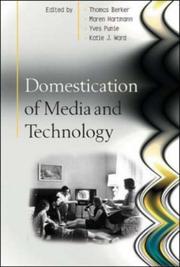| Listing 1 - 10 of 10 |
Sort by
|
Book
Year: 1990 Publisher: Brussel VUB
Abstract | Keywords | Export | Availability | Bookmark
 Loading...
Loading...Choose an application
- Reference Manager
- EndNote
- RefWorks (Direct export to RefWorks)
Book
Year: 2000 Publisher: Brussel VUB
Abstract | Keywords | Export | Availability | Bookmark
 Loading...
Loading...Choose an application
- Reference Manager
- EndNote
- RefWorks (Direct export to RefWorks)
Book
ISBN: 9054871245 9789054871248 Year: 1995 Volume: 8 Publisher: Bruxelles: VUB-Press,
Abstract | Keywords | Export | Availability | Bookmark
 Loading...
Loading...Choose an application
- Reference Manager
- EndNote
- RefWorks (Direct export to RefWorks)
Dit boek analyseert 150 media- en telecommunicatiebeleid en wil daarmee bijdragen aan het breed maatschappelijk debat over de rol en de toekomst van het communicatiebeleid in België en Vlaanderen. Telenet is immers meer dan een Vlaams protest maar, dat leert althans een comparatief en historisch perspectief, is symptomatisch voor wat waarschijnlijk één van de belangrijkste transformaties is van de 20ste eeuw. Met name de evolutie naar een maatschappelijke organisatievorm waar informatie dezelfde impact en belang heeft als destijds de mechanisatie voor de industriële samenleving. Maar het is een evolutie die tegelijkertijd ook veel verder gaat, omdat deze transformatie vooral een inhoudelijke menselijke kant heeft. In de verschillende hoofdstukken wordt dan ook gepoogd deze niet-technische aspecten van wat de informatiemaatschappij heet in te schatten en op wetenschappelijk verantwoorde manier duidelijk te maken.
Belgique --- België --- Flandre --- Informatica --- Informatique --- Media --- Médias --- Telecommunicatie --- Télécommunications --- Vlaanderen --- 621.391 <493> --- 681.3 <493> --- General questions of electrical communication engineering. Cybernetics. Information theory. Signal theory--België --- Computerwetenschap--België --- 621.391 <493> General questions of electrical communication engineering. Cybernetics. Information theory. Signal theory--België --- #SBIB:309H1012 --- #SBIB:309H1710 --- #A9603A --- Telecommunicatie 621.39 --- media --- telecommunicatie --- internet --- 090.1 --- VL / Flanders - Vlaams Gewest - Région Flamande --- BE / Belgium - België - Belgique --- 384.0 --- 384.7 --- Media: communicatiepolitieke aspecten / mediabeleid (nationaal en internationaal) --- Telematica, algemene werken --- massamedia, publiciteitswezen en audiovisuele middelen in België --- Telecommunicatie: algemeenheden. --- Tele-informatie. Datatransmissie. --- Telecommunication technology --- Computer architecture. Operating systems --- communicatiemanagement --- Mass communications --- Flanders --- communicatie --- Informatiemaatschappij. --- Massamedia --- België. --- Telecommunicatie: algemeenheden --- Tele-informatie. Datatransmissie --- Vlaanderen.

ISBN: 1280950765 0335224253 9780335224258 9781280950766 9780335224258 0335217699 0335217680 9780335217694 9780335217687 Year: 2006 Publisher: Maidenhead Open University Press
Abstract | Keywords | Export | Availability | Bookmark
 Loading...
Loading...Choose an application
- Reference Manager
- EndNote
- RefWorks (Direct export to RefWorks)
This book provides an overview of a key concept in media and technology studies: domestication. Theories around domestication shed light upon the process in which a technology changes its status from outrageous novelty to an aspect of everyday life which is taken for granted. The contributors collect past, current and future applications of the concept of domestication, critically reflect on its theoretical legacy, and offer comments about further development. The first part of Domestication of Media and Technology provides an overview of the conceptual development and theory of domestication.
Computers --- Internet --- Home --- Information technology --- Families --- Marriage --- Social aspects. --- #SBIB:309H103 --- Social aspects --- Mediatechnologie / ICT / digitale media: sociale en culturele aspecten --- Mass communications --- Computer. Automation
Book
ISBN: 905487239X 9789054872399 Year: 2000 Volume: 2 Publisher: Brussel VUBPRESS
Abstract | Keywords | Export | Availability | Bookmark
 Loading...
Loading...Choose an application
- Reference Manager
- EndNote
- RefWorks (Direct export to RefWorks)
Télécommunications --- --Belgique --- --Telecommunication --- Telecommunication --- Telecommunication policy --- History --- Telecommunication services --- History of Belgium and Luxembourg --- Communicatie --- Telecommunicatie --- Telecommunicatiebeleid --- Netwerken --- België --- Sociaal-economische geschiedenis --- Geschiedenis --- Netwerkcommunicatie --- 410 Overheidsdiensten en overheidsbedrijven --- 696 Telecommunicatie --- #A0005A --- Electric communication --- Mass communication --- Telecom --- Telecommunication industry --- Telecommunications --- Telecommunication and state --- Government policy --- Communication --- Information theory --- Telecommuting --- Netwerk (ict) --- Geneeskunde --- Techniek (wetenschap) --- Atlas --- Museum --- Netwerk (relationeel) --- Telecommunication - Belgium - History - 19th century --- Telecommunication - Belgium - History - 20th century --- Telecommunication policy - Belgium - History - 19th century --- Telecommunication policy - Belgium - History - 20th century --- Belgique --- 2302 --- telecommunicatie --- Belgium --- Bélgica --- Belgija --- Belgien --- Belgie --- Belgicko --- Beļģija --- Белгија --- Belgio --- Белгия --- Belgia --- il-Belġju --- An Bheilg --- Βέλγιο --- Belgjika --- Belgia Kuningriik --- Beļģijas Karaliste --- Royaume de Belgique --- Belgian kuningaskunta --- Belgické kráľovstvo --- Koninkrijk België --- Belgijos Karalystė --- das Königreich Belgien --- Βασίλειο του Βελγίου --- Kingdom of Belgium --- Кралство Белгија --- Краљевина Белгија --- Belgické království --- Reino de Bélgica --- ir-Renju tal-Belġju --- Regatul Belgiei --- Kongeriget Belgien --- Кралство Белгия --- Mbretëria e Belgjikës --- Belga Királyság --- Królestwo Belgii --- Konungariket Belgien --- Reino da Bélgica --- Kraljevina Belgija --- Regno del Belgio --- telekommunikatsioon --- telecomunicații --- távközlés --- televiestintä --- telekomunikacioni --- telekomunikacijos --- телекомуникации --- telekomunikácie --- τηλεπικοινωνία --- telecomunicazione --- telekomunikacja --- teileachumarsáid --- télécommunication --- telekommunikation --- telecomunicación --- Telekommunikation --- telecommunications --- telekomunikācija --- telekomunikazzjoni --- телекомуникације --- telecomunicação --- telekomunikace --- telekomunikacije --- телекомуникациски оператор --- telekommunikationsnet --- telekommunikationsteknologi --- telekomunikacijske tehnologije --- teknologji telekomunikacioni --- telekommunikáció --- telekomunikāciju tehnoloģijas --- telekommunikatsioonitehnoloogia --- technologie des télécommunications --- Nachrichtenübermittlung --- telecomunicazione via etere --- telekommunikationsteknik --- Fernmeldewesen --- tecnologia das telecomunicações --- τεχνολογία των τηλεπικοινωνιών --- hírközlés --- telekomunikacijų technologija --- tālsakari --- telecommunications technology --- telekommunikációs technológia --- telekomunikačná technológia --- tecnología de las telecomunicaciones --- elektroničke komunikacije --- viestiliikenneteknologia --- telecomunicazione via cavo --- sistema di telecomunicazioni --- servizi di telecomunicazioni --- telekommunikationsmateriel --- tehnologii pentru telecomunicații --- távközlés-technológia --- Fernmeldetechnologie --- telekomunikační technologie --- telecommunicatietechnologie --- Geschiedenis van de nieuwste tijden
Book
ISBN: 2930015047 9782930015040 Year: 1994 Publisher: Ophain: Editions Synedi/RTBF,
Abstract | Keywords | Export | Availability | Bookmark
 Loading...
Loading...Choose an application
- Reference Manager
- EndNote
- RefWorks (Direct export to RefWorks)
Africa --- Miscellanea --- Politique des télécommunications --- Telecommunication policy --- Politique des télécommunications --- Afrika --- Economie --- Ontwikkelingslanden
Digital
ISBN: 9789279585388 Year: 2016 Publisher: Sevilla Europese Commissie - Joint Research Centre
Abstract | Keywords | Export | Availability | Bookmark
 Loading...
Loading...Choose an application
- Reference Manager
- EndNote
- RefWorks (Direct export to RefWorks)
Entrecomp is een referentiekader dat ontwikkeld werd vanuit de Europese Commissie en OESO. Het benadert ‘ondernemerschap’ niet als het louter ‘opstarten van een zaak’, maar als een transversale sleutelcompetentie die voor iedereen in alle levensfasen van belang is. Het competentieraamwerk is opgedeeld in 3 domeinen en 15 competenties, telkens voorzien van bijhorende leer- of ontwikkellijnen. Naast het kader zelf, met de competenties en leerlijnen, is er een gebruikersgids met voorbeeldpraktijken, een animatie die Entrecomp voorstelt en een reeks filmpjes waarin de 15 competenties toegelicht en verbonden worden aan manieren om ze in de klaspraktijk te integreren.
Book

ISBN: 9071894347 9789071894343 Year: 1991 Publisher: Amsterdam: Cramwinckel,
Abstract | Keywords | Export | Availability | Bookmark
 Loading...
Loading...Choose an application
- Reference Manager
- EndNote
- RefWorks (Direct export to RefWorks)
telecommunicatie --- overheidsbeleid --- Telecommunication services --- History of Belgium and Luxembourg --- anno 1800-1999 --- Telecommunication --- History --- 654.1 (493) --- -#SBIB:309H1710 --- #SBIB:309H1012 --- #SBIB:35H120 --- #BUAR:bibl.de Bock --- 654.1 <493> --- #A9203A --- Telecommunicatie 621.39 --- politieke geschiedenis --- management --- België --- geschiedenis --- 376.1 --- Electric communication --- Mass communication --- Telecom --- Telecommunication industry --- Telecommunications --- Communication --- Information theory --- Telecommuting --- Telegraphy. Telephony. Radio. Television--België --- Telematica, algemene werken --- Media: communicatiepolitieke aspecten / mediabeleid (nationaal en internationaal) --- Functioneel gedecentraliseerde besturen / overheidsondernemingen: algemeen --- post, telecommunicatie - geschiedenis --- History. --- 654.1 (493) Telegraphy. Telephony. Radio. Television--België --- #SBIB:309H1710 --- Belgium --- Telecommunication - Belgium - History --- Belgique --- Mass media --- Communication, systemes de --- Conditions economiques --- Histoire --- 1830-1890


ISBN: 9781402066627 9781402066610 Year: 2010 Publisher: Dordrecht Springer Netherlands
Abstract | Keywords | Export | Availability | Bookmark
 Loading...
Loading...Choose an application
- Reference Manager
- EndNote
- RefWorks (Direct export to RefWorks)
Copy the following link for free access to the first chapter of this title: http://www.springerlink.com/content/j23468h304310755/fulltext.pdf This book is a warning. It aims to warn policy-makers, industry, academia, civil society organisations, the media and the public about the threats and vulnerabilities facing our privacy, identity, trust, security and inclusion in the rapidly approaching world of ambient intelligence (AmI). In the near future, every manufactured product - our clothes, money, appliances, the paint on our walls, the carpets on our floors, our cars, everything - will be embedded with intelligence, networks of tiny sensors and actuators, which some have termed "smart dust". The AmI world is not far off. We already have surveillance systems, biometrics, personal communicators, machine learning and more. AmI will provide personalised services - and know more about us - on a scale dwarfing anything hitherto available. In the AmI vision, ubiquitous computing, communications and interfaces converge and adapt to the user. AmI promises greater user-friendliness in an environment capable of recognising and responding to the presence of different individuals in a seamless, unobtrusive and often invisible way. While most stakeholders paint the promise of AmI in sunny colours, there is a dark side to AmI. This book aims to illustrate the threats and vulnerabilities by means of four "dark scenarios". The authors set out a structured methodology for analysing the four scenarios, and then identify safeguards to counter the foreseen threats and vulnerabilities. They make recommendations to policy-makers and other stakeholders about what they can do maximise the benefits from ambient intelligence and minimise the negative consequences.


ISBN: 9781402066627 9781402066610 Year: 2008 Publisher: [Dordrecht] Springer Science + Business Media B.V
Abstract | Keywords | Export | Availability | Bookmark
 Loading...
Loading...Choose an application
- Reference Manager
- EndNote
- RefWorks (Direct export to RefWorks)
| Listing 1 - 10 of 10 |
Sort by
|

 Search
Search Feedback
Feedback About UniCat
About UniCat  Help
Help News
News